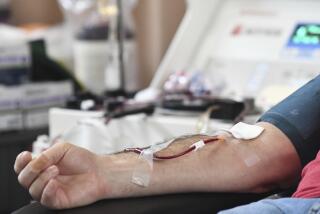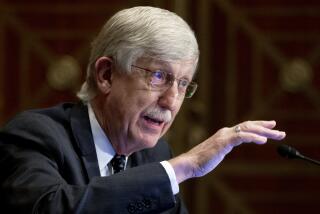AIDS Patients to Get More Experimental Drugs
WASHINGTON — Nearly a year after the idea was proposed, the Department of Health and Human Services announced Friday that it intends to implement a “parallel track” program to give people with AIDS and AIDS-related illnesses access to experimental drugs still in the earliest stages of research.
In addition, the department said that it will consider expanding the program to include drugs for other life-threatening conditions.
HHS Secretary Louis W. Sullivan said the parallel track policy statement will be published for public comment in the Federal Register on Monday, typically the first step in the process of putting a new federal program into effect.
Also on Monday, thousands of AIDS activists and their supporters are expected to demonstrate on the grounds of the National Institutes of Health near Washington to demand an acceleration of AIDS research activities by the federal government.
The parallel track idea has been praised both by mainstream AIDS organizations and by more radical AIDS activists. Nevertheless, many of these groups have grown increasingly critical of the government, accusing it of dragging its feet in putting the program into effect.
“How come it has taken so long? And isn’t it interesting that the bureaucracy moves on the eve of a big demonstration?” said Tom Sheridan, director of public policy of the AIDS Action Council, a coalition of 500 community-based AIDS service organizations. “It isn’t until there is a crisis mode that we find ourselves getting federal leadership.”
The parallel track plan, proposed last June by Dr. Anthony Fauci, director of AIDS research activities for the National Institutes of Health, would make promising new drugs available to AIDS patients at the same time that formal studies of the drugs are scheduled to begin.
“We are proposing this initiative because of its potential for prolonging, perhaps even saving, lives,” Dr. James O. Mason, assistant secretary for health, said in a statement. “It is an appropriate step to take at this time.”
The proposal will remain open for public comment for 60 days before being made final. The program could not begin until late summer at the earliest.
Despite the delay in starting the program, the Food and Drug Administration has on several occasions used existing mechanisms to make experimental drugs available to the desperately ill, including AIDS patients. Recently, it approved expanded patient access to an AIDS drug, DDI, under its “Treatment IND” designation, which allows use of a drug under certain circumstances for compassionate reasons.
Many researchers and others in the scientific community have expressed concern that the parallel track program and other avenues of expanded access could jeopardize formal clinical studies unless they are carefully structured and monitored. Although they often take years, formal trials long have been regarded as the only way to answer important scientific questions about experimental drugs.
Mason emphasized that the parallel track mechanism “is not a substitute for properly conducted and controlled clinical trials.”
He said the department believed “we have built sufficient safeguards into parallel track to ensure that it neither compromises the drug approval and clinical trials process nor delays the speedy delivery of promising investigational agents from the laboratory to the bedside.”
More to Read
Sign up for Essential California
The most important California stories and recommendations in your inbox every morning.
You may occasionally receive promotional content from the Los Angeles Times.










